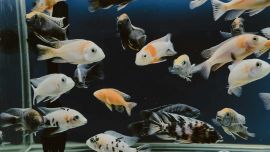An increasingly confined planet, counting its dead and witnessing in terror the collapse of the economy. The coronavirus pandemic has brought us countless pieces of bad news but on closer inspection it is also possible to see the positive points.
Because between improving hygiene, reducing pollution and strengthening social ties, some rays of light break the darkness.
Wash your hands
Since the beginning of the epidemic, health professionals have been repeating the same message over and over again: wash your hands.
A message taken up by politicians, celebrities and social networks.
The aim is to teach us the right technique to wash every part of our hands. And hydro-alcoholic gels sell like hot cakes.
The sense of hygiene seems to be paying off in some countries like Japan, where the number of flu cases has plummeted. Although the season is not over, by early March the country had recorded 7.21 million cases, far fewer than in previous years (a record 21.04 million in 2017-2018).
"We believe that one of the reasons is that people are more attentive to washing their hands properly, due to the spread of the new coronavirus," Daisha Inoue of Japan's Ministry of Health told AFP.
CO2 emissions are down
From an economic point of view, the collapse of demand, travel bans and factory closures is a nightmare. For the environment it is a blessing.
In February alone, Chinese C02 emissions fell by 25 percent, or 200 million tons, compared to the same period in 2019, according to the Clean Air and Energy Research Center (CREA). This drop is equivalent to the annual CO2 emissions of Argentina, Egypt or Vietnam.
The Chinese slowdown also caused coal consumption in China's power plants to plummet by 36 percent, with a drop almost equivalent to oil consumption in the refineries.
As for air transport, the almost total paralysis of the sector helps to reduce its significant CO2 emissions.
There are more positive effects: in Venice, the water has become clearer by putting an end to the constant hustle and bustle of boats full of tourists.
It will be a brief respite because, according to experts, once the crisis is over, economies will try to make up for the delay at the beginning of the year.
Save the pangolin
The origin of COVID-19 is unknown, but the first clues were found in a market in Wuhan (central China) where wild animals were sold for consumption. Among them, bats or pangolins, an endangered species, are cited as a possible vector of the virus.
Therefore, China decided in February to totally and immediately ban the sale and consumption of wild animals, a decision welcomed by environmental organisations.
It already took this step in the early 2000s, during the Severe Acute Respiratory Syndrome (SARS) epidemic, but it did not last. This time, the ban is permanent.
"I think the government has realised that the price society and the economy pay is much higher than this trade can provide," says Jeff He, China director of the International Fund for Animal Welfare (Ifaw).
The possible link between the virus and pangolin also seems to have calmed bushmeat lovers in other parts of the world. In Gabon, the sale of bushmeat has fallen.
Isolated but together
The distance between family and friends is one of the consequences of the confinements to be dealt with.
But for some, these measures strengthen the sense of belonging and make it harder to contact relatives and friends.
In Colombia, Andrea Uribe, 43, has organised, for example, gym classes and family talent contests using video messaging applications.
by Sara Hussein, Agence France-Presse



















Comments